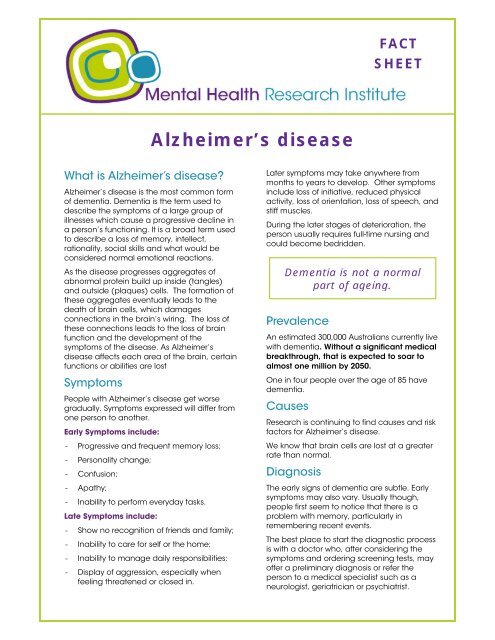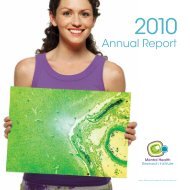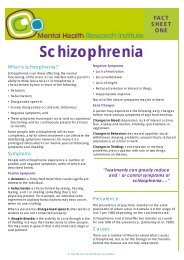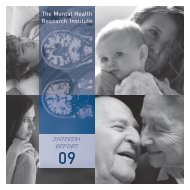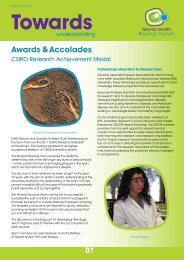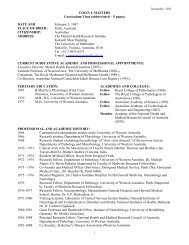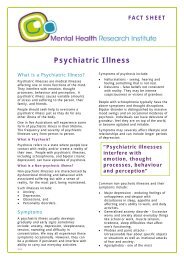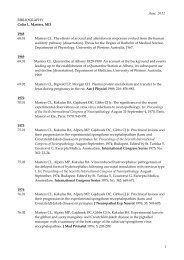Fact Sheet: Alzheimer's disease - Mental Health Research Institute
Fact Sheet: Alzheimer's disease - Mental Health Research Institute
Fact Sheet: Alzheimer's disease - Mental Health Research Institute
Create successful ePaper yourself
Turn your PDF publications into a flip-book with our unique Google optimized e-Paper software.
FACTSHEETAlzheimer’s <strong>disease</strong>What is Alzheimer’s <strong>disease</strong>?Alzheimer’s <strong>disease</strong> is the most common formof dementia. Dementia is the term used todescribe the symptoms of a large group ofillnesses which cause a progressive decline ina person’s functioning. It is a broad term usedto describe a loss of memory, intellect,rationality, social skills and what would beconsidered normal emotional reactions.As the <strong>disease</strong> progresses aggregates ofabnormal protein build up inside (tangles)and outside (plaques) cells. The formation ofthese aggregates eventually leads to thedeath of brain cells, which damagesconnections in the brain’s wiring. The loss ofthese connections leads to the loss of brainfunction and the development of thesymptoms of the <strong>disease</strong>. As Alzheimer’s<strong>disease</strong> affects each area of the brain, certainfunctions or abilities are lostSymptomsPeople with Alzheimer’s <strong>disease</strong> get worsegradually. Symptoms expressed will differ fromone person to another.Early Symptoms include:- Progressive and frequent memory loss;- Personality change;- Confusion;- Apathy;- Inability to perform everyday tasks.Late Symptoms include:- Show no recognition of friends and family;- Inability to care for self or the home;- Inability to manage daily responsibilities;- Display of aggression, especially whenfeeling threatened or closed in.Later symptoms may take anywhere frommonths to years to develop. Other symptomsinclude loss of initiative, reduced physicalactivity, loss of orientation, loss of speech, andstiff muscles.During the later stages of deterioration, theperson usually requires full-time nursing andcould become bedridden.Dementia is not a normalpart of ageing.PrevalenceAn estimated 300,000 Australians currently livewith dementia. Without a significant medicalbreakthrough, that is expected to soar toalmost one million by 2050.One in four people over the age of 85 havedementia.Causes<strong>Research</strong> is continuing to find causes and riskfactors for Alzheimer’s <strong>disease</strong>.We know that brain cells are lost at a greaterrate than normal.DiagnosisThe early signs of dementia are subtle. Earlysymptoms may also vary. Usually though,people first seem to notice that there is aproblem with memory, particularly inremembering recent events.The best place to start the diagnostic processis with a doctor who, after considering thesymptoms and ordering screening tests, mayoffer a preliminary diagnosis or refer theperson to a medical specialist such as aneurologist, geriatrician or psychiatrist.
TreatmentAlthough the search for a cure continues anumber of drugs are currently available inAustralia for use by people with dementia.Cholinergic treatments offer some relief fromthe symptoms of Alzheimer’s <strong>disease</strong> for somepeople for a limited time. They are used bypeople in the early stages of the <strong>disease</strong>.Memantine treatments target aneurotransmitter called glutamate that ispresent in high levels when someone hasAlzheimer’s <strong>disease</strong>. Memantine is currentlyapproved for use for people with moderatelysevereto severe Alzheimer’s <strong>disease</strong>.Other drugs may be used to treat depression,anxiety, agitation, aggression or sleepdisturbances that can be associated with the<strong>disease</strong>.Alternative therapies ranging from oestrogentreatment to anti-inflammatory agents andvitamin supplements are sometimes explored.<strong>Research</strong> ProgramsA number of research projects using variedtechniques are currently being undertaken bythe <strong>Institute</strong>. The Clinical <strong>Research</strong> Group is working todetect biological, clinical and cognitivedifferences between healthy ageing anddementia. They collect, store andanalyse data and samples fromvolunteers for more information visit AIBLat www.mhri.edu.au/clinical-researchgroup- Neuropathology Laboratory is engaged in;the biochemical analysis of the amyloidbeta protein that is the principal marker ofAlzheimer’s <strong>disease</strong>, finding a biomarker inplasma and the search for an earlydiagnostic tool.- Oxidative Stress Laboratory is researchinginto <strong>disease</strong>-modifying treatments forAlzheimer’s <strong>disease</strong> and Parkinson’s<strong>disease</strong> and tests that will help doctorsdiagnose Alzheimer’s <strong>disease</strong> before theonset of symptoms.www.mhri.edu.au Phone: 1800 063 693Professor Colin Masters in 1985 identified thatthis build up is composed of a protein, calledamyloid beta. Our research has revealed thatwhen this normal protein reacts abnormallywith the metals in the brain, this leads to thepathology of Alzheimer’s <strong>disease</strong>.The AD drug PBT2 has been developed tonormalize metal levels in brain tissue. Recenttests in our laboratory have shown the PBT2significantly increased the cognitiveperformance of patients with Alzheimer’s<strong>disease</strong> after only 12 weeks of treatment. Whilemore clinical trials are required it isencouraging to know that the scientificcommunity is getting ever closer to theneeded breakthrough.Dementia is the singlegreatest cause of disability inAustralians over 65.Support & Information ServicesAlzheimer’s AustraliaTel: 1800 100 500Email: nat.admin@alzheimers.org.auWeb: www.fightdementia.org.auVictorian State GovernmentEmail: aged.care@health.vic.gov.auWeb: www.health.vic.gov.au/agedcareVisit our website to find out more about ourresearch www.mhri.edu.auNovember 2012


